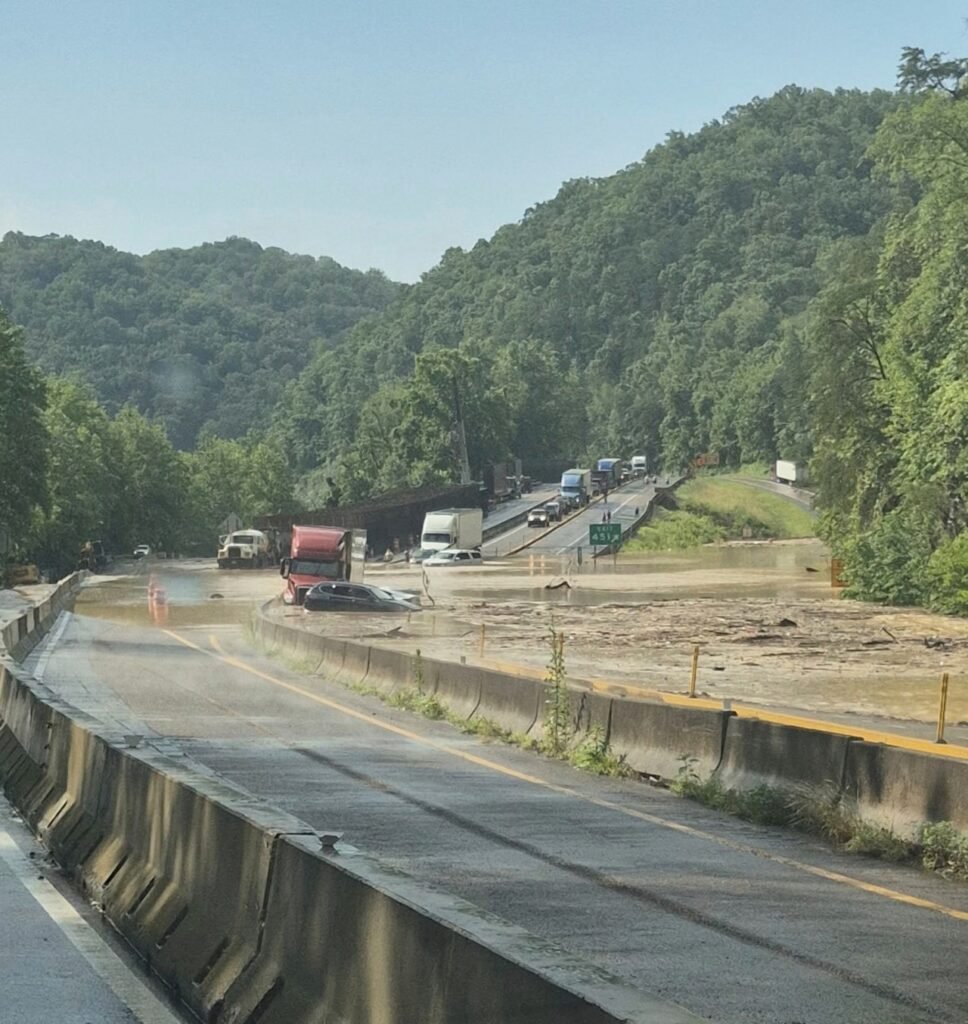Interstate 40 Closure: Heavy Rain Triggers Rock Slide and Flooding in the Great Smoky Mountains
The Great Smoky Mountains have always been a place of both incredible beauty and occasional fury. As someone who’s been writing about these majestic mountains for years, I’ve seen the delicate balance between enjoying their splendor and respecting their power. Yesterday, that power was on full display as nature reminded us who’s really in charge in this breathtaking corner of Appalachia.
Breaking News: I-40 Closed Due to Rock Slide and Flooding
Heavy rain, flooding, and a rock slide have once again closed a section of Interstate 40 along its narrow corridor through the Great Smoky Mountains. The incident occurred Wednesday afternoon around mile marker 450 in Tennessee, just west of the North Carolina state line.
For those of us who love and regularly travel through the Smokies, this closure represents more than just a traffic inconvenience—it’s a reminder of the dynamic, sometimes unpredictable nature of these ancient mountains.
Insert image: Aerial view of the rock slide on Interstate 40 in Tennessee
The Impact on Travel and Local Communities
I-40 serves as a critical east-west transportation artery across the United States, and this particular stretch through the Smokies is one of the few passages through the mountain range. When closures like this happen, they don’t just affect long-distance travelers; they impact local communities on both sides of the Tennessee-North Carolina border.
Local businesses in towns like Newport, Tennessee and Hot Springs, North Carolina often feel the economic ripple effects when the interstate shuts down. Tourism, delivery services, and daily commuters all must scramble to find alternative routes, which can add hours to travel times.
Not the First Time: A History of Slides in the Corridor
Anyone familiar with the I-40 corridor through the Smokies knows this isn’t unprecedented. The narrow passage, carved between steep mountain slopes and the Pigeon River, has experienced several major rock slides over the decades.
The most notorious closure occurred in October 2009 when a massive rock slide near the Tennessee-North Carolina border completely shut down the interstate for about six months. Repairs cost approximately $12.9 million and required extensive engineering work to stabilize the mountainside.
I remember visiting the area during that closure and witnessing firsthand how communities adapted. Local businesses put up signs welcoming “detour traffic,” and some even found creative ways to make the best of the situation.
| Notable I-40 Rock Slides | Duration of Closure | Economic Impact |
|---|---|---|
| October 2009 | Approximately 6 months | Estimated $197 million in lost revenue and additional travel costs |
| January 1997 | 3 months | Significant regional economic impact |
| July 2019 | 1 week | Moderate local impact |
What Causes These Recurring Slides?
Having hiked countless trails throughout the Smokies, I’ve developed a deep appreciation for the geology of these mountains. The Great Smokies are among the oldest mountains in the world, formed over 200-300 million years ago. Their steep slopes, combined with abundant rainfall (the region receives 85+ inches annually in some areas), create perfect conditions for rock slides.
When heavy rains saturate the soil on steep mountain slopes, the weight and lubrication can cause unstable rock formations to give way. The recent heavy rainfall—a common occurrence in what locals affectionately call “the nation’s rainforest”—likely triggered this latest slide.
Recommended Detour Routes
If you’re planning travel through the region while I-40 is closed, here are the primary detour options:
- I-81 to I-26: This northern route takes travelers up through the Tri-Cities area of Tennessee before heading south into Asheville.
- US-25/US-70: A more direct but slower route through Newport and Hot Springs.
- US-441 through the Great Smoky Mountains National Park: Scenic but winding and potentially congested due to tourism.
Insert image: Map showing detour routes around the I-40 closure
When Will I-40 Reopen?
Tennessee Department of Transportation (TDOT) crews are currently assessing the damage and beginning cleanup operations. As of this writing, there is no official timeline for reopening the interstate. Based on previous slides in the area, the closure could last anywhere from a few days to several weeks, depending on the extent of the damage and any necessary repairs to the roadway structure.
I’d recommend checking TDOT’s SmartWay Traffic Information System or calling 511 for the most up-to-date information before planning travel through the area.
The Silver Lining: Nature’s Reminder
While these closures create hardships for travelers and local communities, they also serve as humbling reminders of nature’s power. The very forces that created the stunning vistas and landscapes we cherish also continue to shape them today.
For those whose travel plans are affected, I encourage you to embrace the detour. Some of my most memorable Smoky Mountain experiences have come from unexpected journeys on less-traveled roads. The region is filled with hidden gems, from small-town diners to breathtaking overlooks that you might never discover on the interstate.
Stay Safe and Informed
If you’re planning to travel through the Great Smoky Mountains in the coming days, stay informed about road conditions and be prepared for alternative routes. Pack extra patience along with your map (or GPS), and remember that in the mountains, flexibility is always a virtue.
I’ll be keeping an eye on this situation as it develops and updating this post with new information as it becomes available. In the meantime, let’s send our thanks to the hard-working TDOT crews who are working to clear the roadway and make it safe for travelers once again.
Have you been affected by this closure? Do you have memories of past rock slides in the area? I’d love to hear your stories in the comments below.

